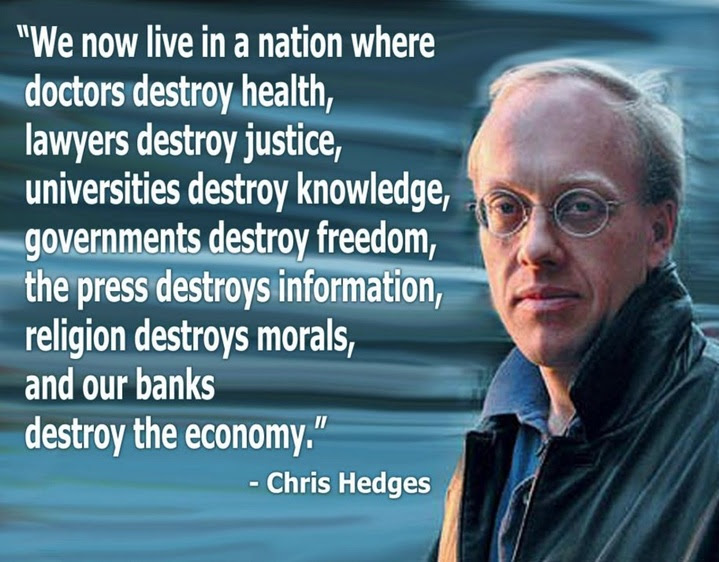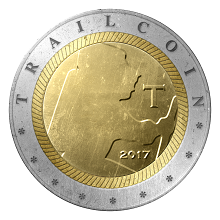Inverted Totalitarianism and Managed Democracy
"If voting was very effective, it would be illegal."

Inverted Totalitarianism
The American political philosopher Sheldin Wolin theorized that we are living under a system of Inverted Totalitarianism. This system is a voluntary subjugation to corporate authoritarian rule existing at the other end of the spectrum from classical totalitarianism.
Pulitzer Prize winner and ex-New York Times journalist Chris Hedges is a proponent of Wolin's sober and disturbing depiction of contemporary America where the corporatist elite completely dominate the political and economic spheres. In Days of Destruction, Days of Revolt, written by Hedges and illustrated by Joe Sacco, inverted totalitarianism is defined as:
a system where corporations have corrupted and subverted democracy and where economics trumps politics. In inverted totalitarianism, every natural resource and every living being is commodified and exploited to collapse as the citizenry is lulled and manipulated into surrendering their liberties and their participation in government through excess consumerism and sensationalism.
For Wolin, the inverted system is democracy turned upside down. The traditional democratic message of 'power to the people' is enshrined in how we understand ourselves as a society, yet is divorced from the truth of our modern political reality.
Managed democracy
Wolin believes the democracy of the United States is sanitized of political participation, and describes it as managed democracy:
"a political form in which governments are legitimated by elections that they have learned to control". Under managed democracy, the electorate is prevented from having a significant impact on policies adopted by the state through the continuous employment of public relations techniques."
Sophisticated mass media propaganda works incessantly to remind us that our fair and noble system is the greatest system in the world and our participation in it, is a crucial component of a healthy democracy.
Wolin sees two central dynamics at play in the United States:
- The first, directed outward, finds its expression in the Global War on Terror and in the Bush Doctrine that the United States has the right to launch preemptive wars. This amounts to the United States seeing as illegitimate the attempt by any state to resist its domination.
- The second dynamic, directed inward, involves the subjection of the mass of the populace to economic "rationalization", with continual "downsizing" and "outsourcing" of jobs abroad and dismantling of what remains of the welfare state created by U.S. President Franklin D. Roosevelt's New Deal and President Lyndon B. Johnson's Great Society. Thus neoliberalism is an integral component of inverted totalitarianism. The state of insecurity in which this places the public serves the useful function of making people feel helpless, thus making it less likely they will become politically active, and thus helping maintain the first dynamic.
Here we see how a population in constant uncertainty, particularly economic uncertainty disengages from the political process focusing instead on survival. As we shall see, this phenomenon Wolin describes as the impotent citizen.
America is Not a Democracy
Wolin's political philosophy resonates with many who take the time to explore his ideas, but there's also evidence to suggest that his theories are indeed rooted in reality. The groundbreaking study, Testing Theories of American Politics: Elites, Interest Groups, and Average Citizens confirms that the will of the people has zero impact on government policy. Policy in the United states is dominated by elite and special interest.
In the first scientific study of its kind, Martin Gilens and Benjamin Page of Princeton University analyzed 1,800 US policies put in place between 1981 and 2002. The study comparing policies favored by elites, special interests and average citizens concluded:
Despite the seemingly strong empirical support in previous studies for theories of majoritarian democracy, our analyses suggest that majorities of the American public actually have little influence over the policies our government adopts. Americans do enjoy many features central to democratic governance, such as regular elections, freedom of speech and association, and a widespread (if still contested) franchise. But, ..." and then they go on to say, it's not true, and that, "America's claims to being a democratic society are seriously threatened" by the findings in this, the first-ever comprehensive scientific study of the subject, which shows that there is instead "the nearly total failure of 'median voter' and other Majoritarian Electoral Democracy theories [of America]. When the preferences of economic elites and the stands of organized interest groups are controlled for, the preferences of the average American appear to have only a minuscule, near-zero, statistically non-significant impact upon public policy.
"America's claims to being a democratic society are seriously threatened"
"When the preferences of economic elites and the stands of organized interest groups are controlled for, the preferences of the average American appear to have only a minuscule, near-zero, statistically non-significant impact upon public policy."
Link to PDF: Testing Theories of American Politics: Elitest, Interest Groups, and Average Citizens
Corporate Power & Inverted Totalitarianism
Chris Hedges believes that Wolin was well ahead of his time in his observations about the fusing of US corporate economic and political power.
“One cannot point to any national institution[s] that can accurately be described as democratic...
surely not in the highly managed, money-saturated elections, the lobby-infested Congress, the imperial presidency, the class-biased judicial and penal system, or, least of all, the media.”
Inverted totalitarianism is different from classical forms of totalitarianism. It does not find its expression in a demagogue or charismatic leader but in the faceless anonymity of the corporate state. Our inverted totalitarianism pays outward fealty to the facade of electoral politics, the Constitution, civil liberties, freedom of the press, the independence of the judiciary, and the iconography, traditions and language of American patriotism, but it has effectively seized all of the mechanisms of power to render the citizen impotent.
The Impotent Citizen
Citizens under inverted totalitarian rule are in a constant state of hopelessness and instability by design. Uncertainty is a cornerstone of the system where the job market is constantly changing and the workers become increasingly wary and anxious.
Wolin,
“Downsizing, reorganization, bubbles bursting, unions busted, quickly outdated skills, and transfer of jobs abroad create not just fear but an economy of fear, a system of control whose power feeds on uncertainty, yet a system that, according to its analysts, is eminently rational.”
Furthermore, the system "perpetuates politics all the time but a politics that is not political." The never ending pageantry of the US election process is emblematic of politics devoid of politics.
“Instead of participating in power, the virtual citizen is invited to have ‘opinions’: measurable responses to questions predesigned to elicit them.”
Chris Hedges echoes Wolin proclaiming that:
Political campaigns rarely discuss substantive issues. They center on manufactured political personalities, empty rhetoric, sophisticated public relations, slick advertising, propaganda and the constant use of focus groups and opinion polls to loop back to voters what they want to hear. Money has effectively replaced the vote.
Every current presidential candidate—including Bernie Sanders—understands, to use Wolin’s words, that “the subject of empire is taboo in electoral debates. The citizen is irrelevant. He or she is nothing more than a spectator, allowed to vote and then forgotten once the carnival of elections ends and corporations and their lobbyists get back to the business of ruling.
Thus, the impotent citizen becomes a passive participant in the political process, a process where he or she has effectively no power and is relegated to the sidelines. The pomp and pageantry, the media circus, and the ritualistic nature of present day politics is almost completely inescapable and achieves its goal of distracting the populace from seeing what the actual system really is.
A Final Quote from Wolin:
"Citizens are encouraged to distrust their government and politicians; to concentrate upon their own interests; to begrudge their taxes; and to exchange active involvement for symbolic gratifications of patriotism, collective self-righteousness, and military prowess. Above all, depoliticization is promoted through society’s being enveloped in an atmosphere of collective fear and of individual powerlessness: fear of terrorists, loss of jobs, the uncertainties of pension plans, soaring health costs, and rising educational expenses.”
Trump Factor?
Some may argue that Donal Trump is an exception, as an outsider who beat the political establishment at its own game. Yet, I would argue that the fact still remains that corporate power, the elite class and special interest fully dominate the political landscape. Trump has also 'filled the swamp' (his administration) with lobbyists, donors, bankers and insiders despite his promise to do the opposite. Trump is powerless in the face of the corporate state, he is part of the show. He's part of the sewing of instability and uncertainty which are currently at an all time high. Regardless of whether you see Trump as a crusading outsider determined to clean up DC, if you believe he is an dangerous demagogue or simply a buffoon, we will remain powerless and impotent until we decide to no longer be bystanders and take back our Democracy.

Hello @v4vapid,
Congratulations! Your post has been chosen by the communities of SteemTrail as one of our top picks today.
Also, as a selection for being a top pick today, you have been awarded a TRAIL token for your participation on our innovative platform...STEEM.
Please visit SteemTrail to get instructions on how to claim your TRAIL token today.
If you wish to not receive comments from SteemTrail, please reply with "Stop" to opt out.
Happy TRAIL!

Great post. I've also talked about the development of learned helplessness from the inability to affect change of our overall way of life on the planet. We are disempowered from not having our voices listened to, and feel helpless. The outsourcing of many responsibilities makes us dependent on a system that keeps us locked in place.
Post-modernism and subjectivism plays well into having everything simply be "opinion" in a so-called "post-truth" era... lol.
Money has replaced the vote indeed, that's what Steemit currently is, a power player platform lol.
Resteemed.
Thank you for that thoughtful response @krnel and I would tend to agree that this learned helpessness is ingrained in the system itself. We're always looking to place responsibility elsewhere and the uncertainty of our present condition makes us cling desperately to the state. We'd rather believe an illusion than face reality.
I will resteem since I'm hoping someone will give it a eye, it's a interesting material more people should read, because that is how it is :)